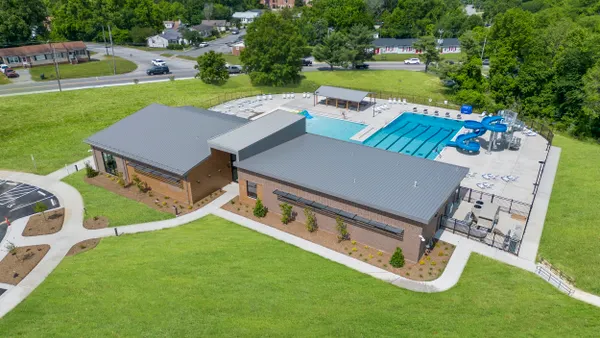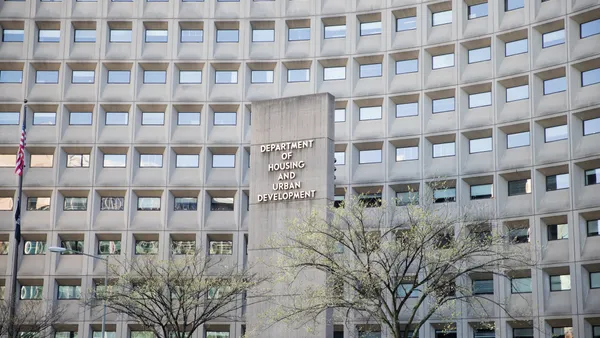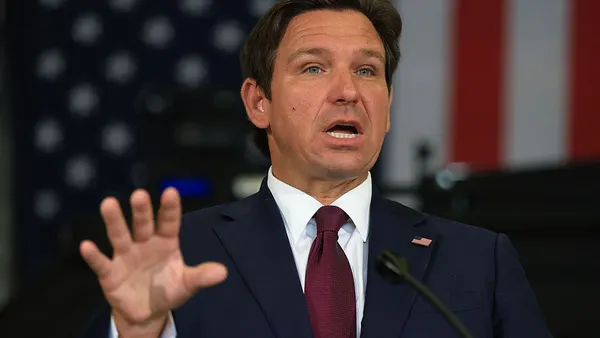Dive Brief:
- Los Angeles Mayor Eric Garcetti sent a letter to President Trump and U.S. Housing and Urban Development (HUD) Secretary Ben Carson requesting more federal assistance with the city's homelessness problem. Carson responded and agreed to help if Los Angeles changed some of its approaches to homelessness mitigation, the Los Angeles Times reports.
- The letter reportedly was vague, but two of the stipulations are that L.A. reduces housing regulations to speed up affordable housing development, and that the city empowers and uses local law enforcement, the Los Angeles Times reports.
- Carson tweeted last week that the agency looks forward to working with L.A. to benefit citizens.
The homelessness crisis in California has been an entrenched problem for a longtime. Per the request of @MayorOfLA & @kathrynbarger we look forward to a new partnership that will benefit our fellow citizens.
— Ben Carson (@SecretaryCarson) January 9, 2020
Dive Insight:
This month, HUD released its annual homelessness report that shows homelessness increased 2.7% nationwide last year. The report specifically called out California for being a troubled area, with a 16.4% increase that is more than all other states combined.
L.A. is especially hard hit, estimated to have more than 50,000 people sleeping on the streets at any given time.
"There's nothing typical about the situation we're seeing in terms of the increase in homelessness in L.A. and other high-cost cities," John Parvensky, acting executive director of the National Coalition for the Homeless, told Smart Cities Dive.
The current cooperative atmosphere on homelessness is a strategy shift for the administration. Trump and Carson have been vocal and sometimes quite critical about California's homeless situation.
During a Fox News interview last month, Carson said the country is making progress on homelessness except in California. At the time, he anticipated working on a collaborative solution with California sometime within a month. When pressed on why no action still has been taken at the federal level months after Carson promised to help California, he said: "I have not found the same urgency in the leadership in the state that I had hoped to find."
Last summer, Trump said the federal government might "intercede" in the homelessness crisis, although he then claimed the government is not equipped for such action and "that's not really the kind of work that the government probably should be doing."
During another Fox News interview, Trump specifically called out L.A. and San Francisco for their homelessness problems and said the affected cities are "usually sanctuary cities run by very liberal people." Months later, administration officials visited L.A. to examine the homelessness issue firsthand. Addressing the nationwide problem more widely, administration officials said they're examining numerous policies to get people off the streets, using what they call "humane policing."
Humane policing — using police to get people off the streets and into shelter or housing — is what some believe Carson's letter to Garcetti referenced when it mentioned law enforcement. Many cities, including Chicago and San Francisco, have used the controversial tactic of using police or other city employees to break up encampments.
Advocates for the homeless say that forcing these individuals to move when they have nowhere else to go is inappropriate and cruel. In many cases, it's also illegal. A decade-long legal battle ended last month when the U.S. Supreme Court refused to hear an appeal in a case regarding arresting unsheltered homeless people. Therefore, the law stands that homeless people cannot be arrested for sleeping in parks or streets if cities do not provide adequate alternative shelter. The original lawsuit stemmed from six homeless people who sued Boise, ID after receiving multiple citations for violating a city law banning people from camping on streets and sidewalks.
Besides being controversial, criminalizing homelessness doesn't result in the outcomes leaders hope for, homeless advocates say.
"Many cities tried to infuse law enforcement to prevent people from sleeping outdoors or creating encampments, to less than satisfactory outcomes. It doesn't solve the problem, it typically just moves the problem around," Parvensky said. "We advocate as a solution not to criminalize homelessness, but to create long-term housing options for people. And to ensure an adequate supply of round-the-clock emergency shelter that is low-barrier and allows people to keep their possessions, stay with their partners and not give up pets they may have."
He explains that moving homeless people to another area can impede the efforts of connecting them with resources including shelter and medical care. When people repeatedly have to seek help from new sources instead of working with consistent caregivers, "it makes it more difficult to connect with people and they become less trustful and less willing to accept help," Parvensky said.
He also cautions that changing housing regulations — one of the other federal suggestions — doesn't always solve the problem, either. Regulation changes can help, but they tend to achieve the most success when complemented by other measures. The regulation changes and resulting affordable housing do not always benefit the lowest-income populations, who are most likely to suffer from chronic homelessness.
"If it does create new housing, it would likely be outside of the affordability range of those on the streets," Parvensky said. "Without additional assistance to help people afford rent in high-cost communities, you're still going to see some increase in homelessness."
So far it is unclear what solutions the federal government will pursue in L.A. because the talks among leaders have been private. But two suggestions are that it might offer assistance with transitional housing and federal land on which to build shelters.
"We've been focusing on the change" and remaining optimistic about the inter-agency collaboration, Parvensky said. However, he adds that advocates for the homeless remain concerned about the stipulations for receiving the federal assistance. "Usually when the [federal government] provides funding in any arena, there are a lot of strings attached."
The L.A. Mayor's Office did not respond to Smart Cities Dive's request for comment prior to this story's publication. HUD neglected to offer direct comment and instead pointed to Ben Carson's Twitter account for reference.











